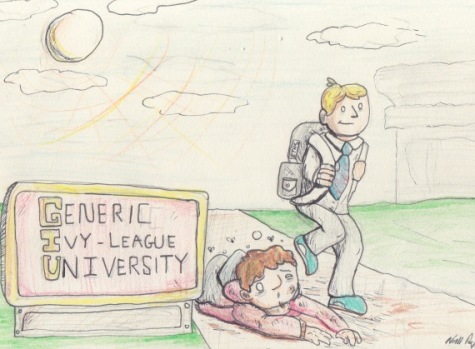Warmer temperatures means colder winters
Somewhere Inconvenient Truth star and former presidential candidate Al Gore must be laughing at us all. Last year, Chicago experienced its coldest winter since 1872, according to the National Weather Service. This year is shaping up to be no different. With temperatures sinking lower than my GPA, snow piling up to unprecedented heights, and the threat of frostbite constantly looming, it’s clear that this winter has been harsh.
However, the groundhog’s shadow is not to blame for this seemingly-everlasting winter. The root of our weather woes is actually global warming. But Claire, you say, clutching the paper and scratching your head in confusion, I thought global warming only affected WARM weather. Well, dear reader, yes and no.
Although some doubt the existence of global warming and its effect on our environment, it’s indisputable that glacier ice caps are melting. According to research conducted at Tokyo University, the melting exposes darker waters in the Northern Hemisphere. Because of its dark nature, the water absorbs more heat– thus making the air around it hotter. The heating of the glacial ice caps and the air around it causes a disruption in the polar jet stream, sending cold polar air southern and giving us harsher winters. TL,DR: Glaciers are melting, polar bears are crying, and cold weather travels downward due to disruption of the jetstream. The hotter summers caused by global warming also motivate colder winters.
So, much like your mother’s mood as she descends into old age, the weather on our planet shifts dramatically from low to high and back again. We have global warming to thank for this. Or, in your mother’s case, menopause.
All terrible similes aside, this problem is real. We are not taking care of our planet and we are paying the cost real time. This is not an issue we can largely ignore and send-off to the next generation. There is action to be taken now so that we, and those who come after, can begin to fix the cruelties we have done unto our planet.
The United States Environmental Protection Agency offers several suggestions for how to help the planet be healthier. At home, it’s important to recycle regularly, use water efficiently, and pay attention to the heating/cooling of your house. That means no keeping the sink on while brushing your teeth and paying special attention to your thermostat. At school, the Agency emphasizes the importance of keeping up with the state of the school’s carbon footprint. By knowing how much waste we expend as a school, we can troubleshoot problems from there. If we all recycled a little, paid attention to our water use, and maybe attended a few Green Team meetings, we could make a big difference.
Global warming is not a topic that should be forgotten as soon as our sweltering summers are over. However counterintuitive it may seem, global warming is just as important in the winter. If we work hard to rectify this issue together, perhaps we can creating a better world for ourselves and our future children.
Your donation will support the student journalists of the Evanstonian. We are planning a big trip to the Journalism Educators Association conference in Philadelphia in November 2023, and any support will go towards making that trip a reality. Contributions will appear as a charge from SNOSite. Donations are NOT tax-deductible.










